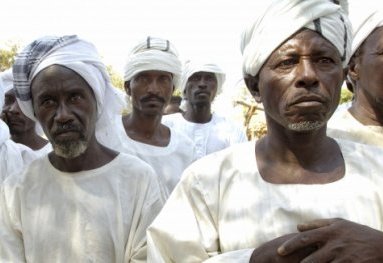80 killed in Misseriya clan clashes in South Kordofan – witness
December 8, 2013 (LONDON) – Around 80 people were killed in fighting between rival clans of the Misseriya tribe in the town of al-Fula in South Kordofan State on 6 January, a source in the area told Sudan Tribune on Tuesday.
 The fighting began at 8am on Sunday 6 January when the Awlad (Sons of) Heiban attacked al-Fula town killing 20 members of the Awlad Serur and Awlad Metanin Misseriya groups, who live in the area.
The fighting began at 8am on Sunday 6 January when the Awlad (Sons of) Heiban attacked al-Fula town killing 20 members of the Awlad Serur and Awlad Metanin Misseriya groups, who live in the area.
The source in Al-Fula, which is in the west of the state, said that police and security forces were outnumbered and did not intervene in the clash, which lasted for around 10 hours.
Initial reports indicated that 11 people were killed from the Heiban clan and 6 from Awlad Serur and Metanin but the number of fatalities appear to have increased dramatically as police brought bodies back from the scene of the fighting, on the edge of the town, to Al-Fula’s graveyard.
The witness in Al-Fula told Sudan Tribune that 60 members of the Awlad Heiban clan, who attacked the town, as well 20 members of Awlad Serur and Awlad Metanin were killed during the defence of the town. The true number of dead was only now emerging, he said, now that security was being restored to the area.
The source said he had seen the graves of those killed, as they had been buried on Monday and Tuesday.
Many of those involved in the fighting were former members of the police and the Popular Defence Forces (PDF) – a government paramilitary armed during the two-decade civil war with southern rebels – in now what is independent South Sudan – and members of the Nuba tribe from the Nuba Mountains in the central and eastern parts of South Kordofan.
As part of the 2005 peace deal that led to South Sudan’s separation 18 months ago, the predominantly Misseriya populated Western Kordoan State was merged into South Kordofan State.
However the SPLM-North have been fighting the government in South Kordofan since June 2011 after a disputed election and the failure to implement popular consultations and over aspects of the 2005 peace deal related to the area before South Sudan’s independence.
Sudan’s President Omar al-Bashir confirmed in his New Year address that the government has proposed re-instituting Western Kordofan State. Such a move is seen by some as potential way to end the conflict by appointing Governor Ahmed Haroun to head Western Kordofan and offering the SPLM-N’s Abdulaziz al-Hilu, who lost to Haroun in the April 2011 election, the position of Governor of a reconstituted South Kordofan.
The possibility of a deal of this nature has been made less likely by the SPLM-N’s coalition with Darfur rebels, which it entered into after a framework agreement with the government in August 2011 was rejected by Khartoum, leading the outbreak of fighting in Blue Nile, another state on the border with South Sudan.
Considering the level of violence and the apparent high number of dead from Sunday’s clashes, it is expected to be some months until a Misseriya conference can be organised to address the differences that caused the recent conflict, as security and trust between the clans will first have to be restored.
Before oil was discovered in South Kordofan the Misseriya did not have such fierce disputes over land between their various clans, according to local people. But since oil was discovered the value and potential value of land has risen significantly, with groups hoping they will benefit if oil is discovered on land they control.
(ST)
